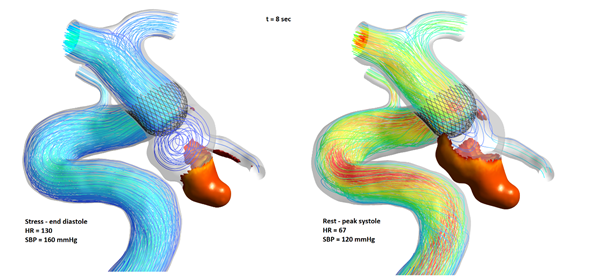Vascular flow simulation directly from medical images to support automated workflows for in-silico trials
- Academic lead
- Dr Toni Lassila, School of Computing, T.Lassila@leeds.ac.uk
- Co-supervisor(s)
- Prof Alejandro Frangi, School of Computing and School of Medicine, A.Frangi@leeds.ac.uk, Dr Amirul Khan, School of Civil Engineering, A.Khan@leeds.ac.uk
- Project themes
- Biomedical Flows, Underpinning Methods for Fluid Dynamics
Computational fluid dynamics (CFD) simulations can assist in treatment planning for cardio/cerebrovascular interventions. This project involves the development of fully-automatic images-to-simulation workflows that can be translated to clinical practice by developing new CFD methods that can be applied directly on the medical images, without need for manual vessel segmentation and volume meshing. The flow equations will be solved using the immersed boundary -method, which doesn't require body-fitting meshes to be generated. The student will develop automated simulation workflows for in-silico trials, i.e. computational models for assessing the safety and efficacy of new medical devices in virtual populations to accelerate the regulatory approval of new devices and to reduce the size of animal tests and pre-clinical trials.

Figure 1: Virtual treatment planning model for flow diversion in cerebral, analysis of post-treatment clotting in two different flow scenarios (courtesy of Dr Ali Sarrami-Foroushani)
